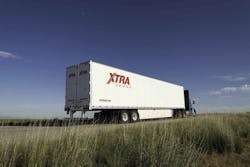Wringing the most fuel efficiency out of a trailer, especially dry van and refrigerated, or reefer, models that are shaped like bricks, is not an easy task. That’s why Steve Zaborowski, senior vice president at XTRA Lease, said his company, which manages a fleet of 75,000-plus trailers, focuses on three main areas when it comes to improving fuel economy.
“First, there’s the gap between tractor and trailer. Closing that up reduces aerodynamic drag and improves fuel savings,” he explained. “There is also a big aerodynamic drag underneath the trailer. We’ve closed that up with side skirts. Finally, there are new and retreaded low-rolling resistance tire models. And the tire manufacturers are now coming out with new models of tires to further improve fuel efficiency. We see that as important for our fleet customers.”
In terms of trailer suspensions, Zaborowski said XTRA has not seen a “big difference” between spring and air ride suspensions in terms of weight savings, which, in turn, would generate more fuel savings. “There’s not much more we can do with the suspension. The primary thing we’ve done underneath the trailer is with landing gear,” he said. “We’ve focused on extending maintenance intervals for the landing gear ‘legs’ by using a gear assembly with self-greasing screws, so we don’t have to touch it for five years.”
Candidly, he said there has been some focus on improving corrosion resistance of the landing gear and trailer undercarriage, a move to what he dubbed as “more galvanization.” But the focus at XTRA right now is on achieving benefits without weight penalties, which impacts payload and fuel savings. That’s a tough needle to thread.
Zaborowski noted that “the answer” is to take an incremental approach: to save weight where it can be saved (which thus can improve fuel efficiency) while maintaining durability and strength. “We don’t want to do anything that affects good solid trailers with a 10- to 12-year life cycle—we can’t jeopardize durability,” he stressed.
Over the last several years, Zaboroski noted that XTRA has “probably taken” 300 to 400 lbs. out of its dry can and reefer trailers, using a mix of composite plate, aluminum, and high tensile steel in the overall structure along with spec’ing aluminum hubs and wide-base tires. “Those are [specs] for the real heavy haulers,” he pointed out. “Honestly, it is more about payload than fuel savings.
“I don’t see this happening next year but farther down the road,” Zaborowski said. Improvements in trailer materials will generate more fuel savings, he explained.
“I think you are seeing that with bonded instead of riveted panels,” he added. “The question really is, how do we get it ‘mainstream’ enough so the choice by us and our customer is financially palatable. We are very, very focused on enabling things for customers to save fuel. Hopefully, with newer materials, we can find more ways to lighten up trailers and save more fuel.”
About the Author
Fleet Owner Staff
Our Editorial Team
Kevin Jones, Editorial Director, Commercial Vehicle Group
Cristina Commendatore, Executive Editor
Scott Achelpohl, Managing Editor
Josh Fisher, Senior Editor
Catharine Conway, Digital Editor
Eric Van Egeren, Art Director
